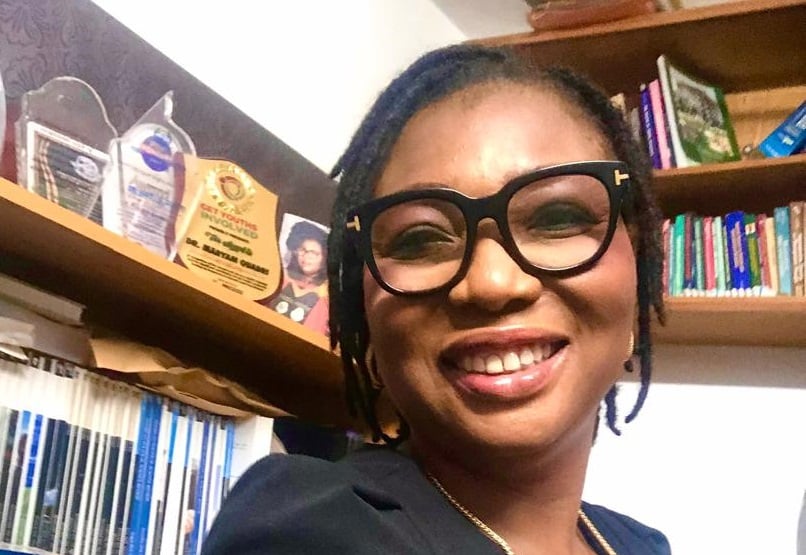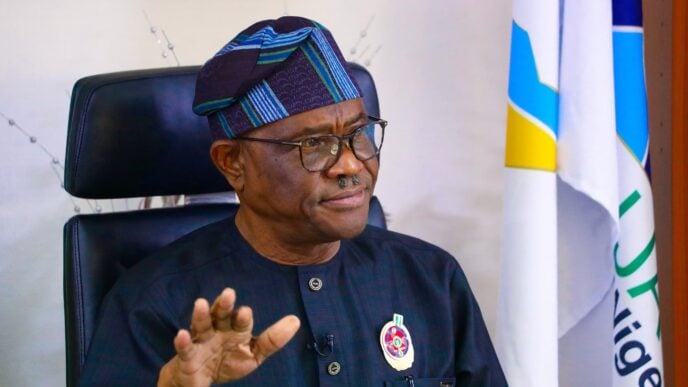UNILAG's Professor Maryam Quadri
Becoming the first female professor of political science at the University of Lagos, for Maryam Quadri, is a journey sparked early in life and fueled by unwavering dedication.
Her path began not in a university lecture hall, but in a secondary school classroom.
In her second year at Ilupeju Grammar School, a youth corps member teaching government captivated her with his nuanced approach to teaching. This encounter led a young Maryam to inquire about his university major. Upon hearing about political science, her career trajectory was set. This early spark saw her pursue political science at the University of Lagos, culminating in her doctorate, where she would specialise in public administration and public policy.
Professor Quadri’s commitment to her field extends far beyond the confines of UNILAG.
Advertisement
She has actively engaged with global academic communities, serving as a Commonwealth Fellow at Roehampton University in 2012 and a visiting scholar at Kennesaw State University in 2011. Her involvement as a Fellow of the American Political Science Association’s Africa Workshop in 2014 and her leadership role as general secretary of the Commonwealth Scholars and Fellows Alumni Association in Nigeria (COSFAN) highlights her dedication to fostering academic collaboration and influencing policy.
Quadri has consistently bridged the gap between academic rigour and practical applications.
Her research spans health policy, gender & development, and women’s political participation. Her sustained engagement on the editorial boards of key academic journals further solidifies her standing as a prominent voice in political science, making her an inspiring figure for aspiring scholars and a valuable asset to Nigeria’s academia and public policy discourse.
Advertisement
In this interview with TheCable’s Stephen Kenechi, she talks about her journey.
The professor also shares insight on the drivers of women’s political under-representation in Nigerian politics and why the country needs a stronger connection between academic research and policy implementation.
Stephen Kenechi: Becoming the first female professor of political science at UNILAG is quite a feat. Can you share the defining moments or influences that shaped your decision to pursue political science and eventually reach this milestone?
Maryam Quadri: Thank you. I am sure you will find this interesting. It was in my second year in secondary school. So, we had this youth corps member teaching us government as a subject, and most of our teachers were grade two teachers.
Advertisement
But Mr. Bello’s (the government teacher) manner of teaching the subject was different. One afternoon, I walked up to him and asked him, “Mr. Bello, what did you study at the university?” And he replied, “political science”.
I made up my mind there and then that I was going to study political science. So after my A-level studies, I applied to study political science at the University of Lagos.
Stephen Kenechi: Only recently have UNILAG and other top institutions like OAU noticeably started appointing female professors in political science. What barriers did you encounter as a woman in this field, and how did you overcome them?
Maryam Quadri: Well, I will say the discipline of political science is male-dominated, so you don’t have many women coming to venture into studying it.
Advertisement
One major constraint is that, because of the limited number of women in the discipline, you don’t find women as your peers to engage and collaborate with. For example, in my first degree years, there were only three women, including myself, in the class.
So it was just the three of us hanging out together when we were not with our male colleagues.
Advertisement
We compete with male colleagues. As a lecturer in the field, did I experience barriers as such? I will say no, because the university promotes inclusivity, and diversity amongst staff is recognised.
Stephen Kenechi: How do you think institutions like the University of Lagos can scale up mentorship and support systems to encourage more women in political science and academia?
Advertisement
Maryam Quadri: I have somehow indicated earlier that the university does not discriminate based on gender in terms of recruitment and placement of persons in positions in the university.
For example, in the not-too-distant past, the university had a female vice-chancellor and two deputy vice-chancellors; the registrar and bursar were also female, although currently, we have two male deputy vice-chancellors.
Advertisement
However, deliberate efforts to bring more women into the discipline of political science need to be encouraged. Showcasing the achievements of a few women in the discipline can serve as a sort of motivation for potential female scholars.
Stephen Kenechi: Your doctoral research explored community participation in primary healthcare delivery. What broader insights can you draw from it for governance, gender inclusion, and the role of women in public policy?
Maryam Quadri: My work, taking its root from the doctoral thesis, stresses participation in the decision-making process (political process, grassroots participation, and governance among others) to develop more inclusive and equitable policies.
For example, my thesis recommends a shift in emphasis from the institutional approach to a community-based health care approach, in which primary health care is required to give voice to community people in health decision-making.
This invariably may incorporate diverse stakeholders, including women’s participation in community health governance for people’s development and strategic planning for a country’s overall developmental goals.
Stephen Kenechi: How do you view the relationship between academic research and policy implementation in Nigeria? What are the biggest gaps, and how can they be bridged?
Maryam Quadri: Epistemic communities have a role to play not only in influencing policy formulation but also in implementation.
The academia and policy think tanks can negotiate the policy process through evidence and rigorous data.
Having done this, they will be interested in knowing how the government implements its policies and act as a watchdog to ensure that the government is doing what is right and beneficial to the people.
But what happens sometimes in our policy environment is the failure of the government to make use of research outputs.
This gap is sometimes evident in the nature Nigeria’s policy decisions and ultimately in their implementation.
Stephen Kenechi: Gender politics in Nigeria remain a challenge. How do you see the roles of academia, civil society, and government intersecting to promote women’s leadership and participation?
Maryam Quadri: Women’s under-representation in politics continues to be a challenge in Nigeria.
It seems the more the Nigerian women tried to grapple with and surmount the various challenges they confronted in their efforts to attain the height of political decision-making, the harder it became.
Women and men in academia, especially gender scholars, are continuously interrogating the reasons for the low participation of women in politics and how it can be addressed.
Civil society organisations are continually exerting pressure on the government to address the issues of women’s marginalisation in political leadership in the country. But surprisingly, there are still many fault lines, and the situation remains the same.
Stephen Kenechi: You have engaged with global organisations such as APSA and the Commonwealth Fellowship. How have these international experiences informed your perspective on local reform and collaboration?
Maryam Quadri: My experience in these two fellowships has engendered some forms of engagement which had contributed to and continue to influence collaborations in many areas.
For instance, I was the secretary general of the Commonwealth Scholars and Fellows Alumni Association in Nigeria (COSFAN) from 2023 to April 2025.
The association is committed to collaborating with government, policymakers, and practitioners on many fronts to influence the decision-making process, and I have been part of this endeavour.
Stephen Kenechi: Data shows that Nigerian women hold just 6.7% of elective and appointive positions, far below Africa’s 23.4% average and the global 22.5% benchmark. From your perspective, what are the most stubborn structural or cultural barriers holding this back, and what realistic policy interventions could help close the gap?
Maryam Quadri: Nigerian women have continued to fall short of expectations in attaining political leadership due to broader ideologies and beliefs about women’s place in society.
Deep prejudices embedded in socio-cultural attitudes also hinder women’s political ascendancy.
For instance, while men are considered aggressive, active, and instrumental, women are perceived as passive, dependent and emotional. Therefore, they are seen as not fit to occupy strong political positions.
Effective legislation on quotas and probably on reserve seats for women, or other forms of affirmative action, could assist women in their challenge to be relevant in political decision-making.
Stephen Kenechi: Research on political participation in Nigeria shows how party gatekeeping undermines women’s candidacy. What are your thoughts on party-level exclusion?
Maryam Quadri: Political parties play a very crucial role through their policies on gender issues in their parties.
How those issues are articulated in their manifestos and constitutions and how they get implemented form the reference point for assessing the commitment of parties to women’s political empowerment.
It is the oligarchic structure and behaviour of political parties and ingrained patriarchal rules that conspire against women more than anything else.
The inability of parties to practice internal democracy has also continued to disempower women politically.
Perhaps, legislation that a certain percentage of the list of candidates for elections by parties must be allocated to women may address this situation. This may give rise to an increase in the number of women that parties put up for the general elections.
Stephen Kenechi: What advice do you have for early-career female scholars in political science or public policy who aspire to leadership?
Maryam Quadri: To advance in any career path one has chosen requires strong determination.
This is what propels every other force one needs for advancement and success. A young scholar from the beginning must set a goal for himself/herself and pursue it with all vigour.
Persistence, perseverance, and keeping a positive outlook are some of the requirements for success.
Distractions will come, but the determination to succeed is what will keep such a scholar focused.
Stephen Kenechi: What are your next goals, both within the university and in terms of your research or public engagement? Are there any upcoming projects you’d like to talk about?
Maryam Quadri: I aim to engage more in research and collaborative work with colleagues both locally and internationally.
I want to continually inspire and mentor the female academia and encourage more women to come into my discipline (political science).
Currently, we are few in number across universities in the country.
Of course, there are upcoming projects which I do not wish to discuss for now.










